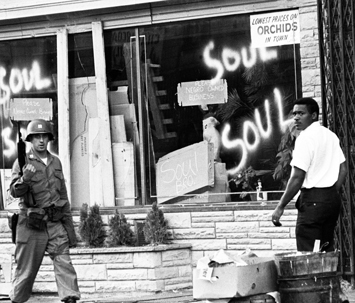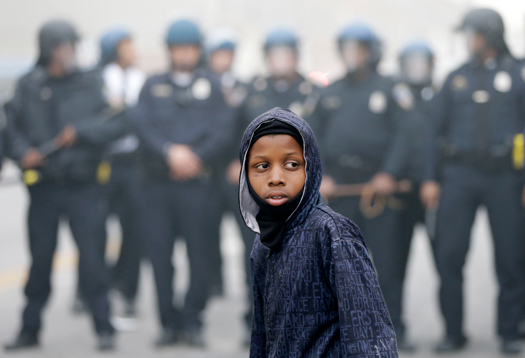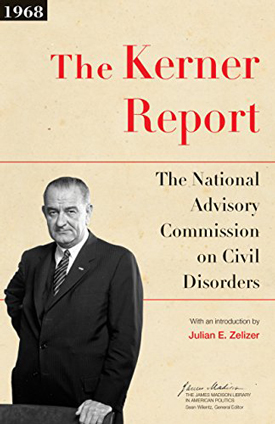Still 'two societies, one Black, one White separate but unequal'
By Michael Z. Muhammad -Contributing Writer- | Last updated: Mar 9, 2018 - 9:31:06 PMWhat's your opinion on this article?

In this July 15, 1967, file photo, a National Guard officer passes the smashed window of a Black-owned flower shop in riot-torn Newark, N.J., after a night of looting and violence. The small sign in window reads, "Please!! Negro-Owned Business." Former U.S. Sen. Fred Harris, the last surviving member of the Kerner Commission, says he remains haunted that the panel's recommendations on U.S. race relations and poverty were never adopted, but he is hopeful they will be one day. He strongly feels that poverty and structural racism still enflame racial tensions even as the United States becomes more diverse.
|
Does it dry up
Like a raisin in the sun?
Or fester like a sore—
And then run?
Does it stink like rotten meat?
Or crust and sugar over—
like a syrupy sweet?
Maybe it just sags
like a heavy load.
Or does it explode?
Langston Hughes, ‘Dream Deferred’
Minister Louis Farrakhan of the Nation of Islam asked a question in his underground 1960 hit record, “White Man’s Heaven is a Black Man’s Hell:” “Why is everybody making progress, yet we seem to be lagging so far behind?”
That question is just as relevant today as it was when the Minister sang those lyrics.
How much longer will it be before Black people in America explode? How long can the dream of equal opportunity in America be deferred?
A new study released by the Economic Policy Institute indicates Black existence in America will continue to fester like a sore unless serious changes take place.
There are chilling findings in the study titled “50 years after the Kerner Commission African Americans are better off in many ways but are still disadvantaged by racial inequality.” Since the 1968 Kerner Commission report on the causes of civil unrest in Black communities, Black America has made zero progress in the critical areas of homeownership, incarceration, and unemployment.

In this April 27, 2015 file photo, a boy stands in front of a police cordon following the funeral of Freddie Gray in Baltimore. The 25-year-old man was shackled but alive when he was put in Baltimore police van in April 2015. He came out with severe neck injuries, and his subsequent death led to rioting. Six officers were charged initially, but prosecutors in July dropped all remaining charges after acquittals and a hung jury. Gray's family agreed to a $6.4 million settlement with the city in September 2015.
|
How is that possible? According to the study, the culprit is that boogie man called racism. The report found:
· 7.5 percent of Black Americans were unemployed in 2017, compared with 6.7 percent in 1968, roughly twice the White unemployment rate.
· The rate of homeownership, one of the most critical ways for working and middle-class families to build wealth, has remained practically unchanged for Black Americans in the past 50 years. Black homeownership remains just over 40 percent, trailing 30 points behind the rate for Whites, who continue to see gains during that time.
· The share of incarcerated Blacks has nearly tripled between 1968 and 2016—one of the most significant and most depressing developments in the past 50 years, especially for Black men, researchers said. Blacks are 6.4 times more likely than Whites to be jailed or imprisoned, compared with 5.4 times more likely in 1968.
· In 1968, Black infants were about 1.9 times as likely to die as White infants. Today, the infant mortality rate is 2.3 times higher for Black babies.
One of the most intriguing aspects of the study is the finding that Blacks today are much better educated than they were in 1968. “These absolute improvements in educational attainment—including substantial increases in both high school and college completion rates—have opened important doors for Black workers compared with their counterparts 50 years ago,” the study says. “In relative terms, African Americans today are almost as likely as whites to have completed high school. But even though the share of younger African Americans with a college degree has more than doubled, African Americans today are still only about half as likely to have a college degree as whites of the same age.”
But even with this improvement, Black workers make only 82.5 cents on every dollar earned by White workers. Blacks are 2.5 times more likely to be in poverty as Whites, and the median White family has almost 10 times as much wealth as median Black family wealth.
The gist of the report is that Black people in America continue to trudge in the mud with no apparent light at the end of the tunnel. The attitude of White America is “I don’t have pity for you black niggas, that’s the way I feel,” according to the lyrics of Joyner Lucas.
Consider Detroit’s Algiers Motel in 1967 where three young Black males were shot to death by the police. The officers initially weren’t indicted, and the media refused to press the issue. They were later tried and found not guilty. Similar cases in recent years blazed headlines, ignited protests and the Black Lives Matter movement.

The Kerner Report
|
Activist and sociologist Dr. Anthony Monteiro told The Final Call the original Kerner Commission report was a moment of rare and extraordinary honesty coming from the White elite.
“Until this study, there has not been this type of truth telling,” he observed. “I believe the lack of progress made by the Black community has been intentional, based on policy—the policy of enriching the top one percent and impoverishing the masses of Black people. The destruction of public education, moving jobs away from urban areas, the policy that led to the collapse of the housing market in 2008, policies that (sold) Black people fraudulent mortgages ending up with Black people losing their only source of wealth, their home.”
“There is no doubt the finding of the report is true. The United States has evolved into a White supremacy social system. It is intended for Black people to always be in poverty, intergenerationally,” Dr. Monteiro said.
Philadelphia NAACP president Rodney Muhammad told The Final Call, “One tragedy here is you don’t see the increase in Black education benefiting the community. It doesn’t translate into any economic foreword movement.”
“The education does not provide requisite knowledge, as termed by the Honorable Minister Louis Farrakhan, the knowledge that translates and brings better results for quality of life for Black people. What we are learning is not catapulting us forward like other ethnic groups.”
Mr. Muhammad, who is also a Nation of Islam regional student minister, felt the report required more than a condemnation of racism. “Other social groups have been able to move ahead of us because of their ability to pool their resources,” he argued. “Our biggest problem is thinking individually and not as a social group. Individualism has poisoned our real efforts to move forward, especially with an economic agenda.”
“We can come together for a party and have fun. When we start talking about economic advancement as a social group, it takes the kind of thinking that would say ‘I want for my brother what I want for myself.’ Until that kind of thinking permeates our thinking as a social group, we are always going to have difficulty,” he said.
Philadelphia Inquirer reporter Solomon Jones seemed to echo Dr. Monteiro when he recently wrote, “Racism is a white man’s problem and until we (as a country) admit that sobering fact we will remain in the same racial quagmire.”
The most famous line from the Kerner Commission report was “our nation is moving toward two societies, one Black, one white separate but unequal.”
“What we need is a new way of defining what this situation is. That puts us beyond the civil rights struggle to a more profound struggle that emphasizes a systemic change in the Black community and the country,” Dr. Monteiro said.
INSIDE STORIES AND REVIEWS
-
-
About Harriett ... and the Negro Hollywood Road Show
By Rabiah Muhammad, Guest Columnist » Full Story -
Skepticism greets Jay-Z, NFL talk of inspiring change
By Bryan 18X Crawford and Richard B. Muhammad The Final Call Newspaper @TheFinalCall » Full Story -
The painful problem of Black girls and suicide
By Charlene Muhammad -National Correspondent- » Full Story -
Exploitation of Innocence - Report: Perceptions, policies hurting Black girls
By Charlene Muhammad -National Correspondent- » Full Story -
Big Ballin: Big ideas fuel a father’s Big Baller Brand and brash business sense
By Bryan Crawford -Contributing Writer- » Full Story






 Click Here Stay Connected!
Click Here Stay Connected!








